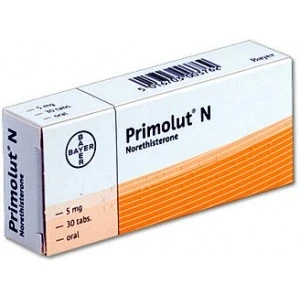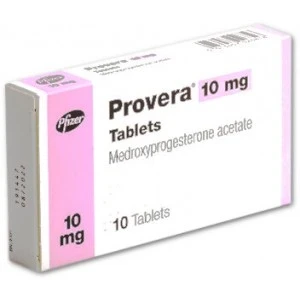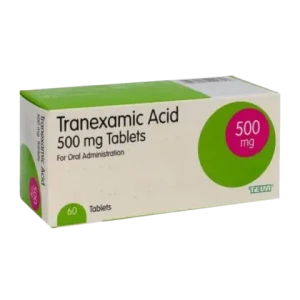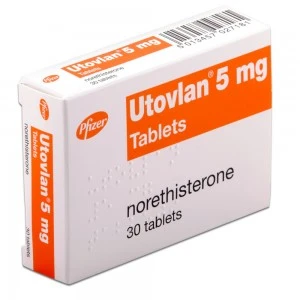Heavy Periods (Menorrhagia)
Periods are a normal part of a woman’s menstrual cycle, but for many women, heavy or painful periods are a bothersome norm. It’s reported that around 1 in 20 women aged between 30 and 49 contact their GP about heavy periods or other menstrual problems, while up to 37% of adolescent girls experience heavy periods.
There’s no need to suffer in silence, though, as there is help available to help you manage heavy or painful periods, leaving you to get on with your day.
Primolut N
- Relieves period cramps
- Regulates the menstrual cycle
- Available from a UK pharmacy
Provera
- Relieves menstrual cramps
- Regulated periods
- Available from a UK-registered pharmacy
Tranexamic Acid 500mg
- Reduces Heavy Menstrual Bleeding
- Non-Hormonal Convenience
- Versatile Usage
Utovlan
- Relieves period pain
- Eases heavy bleeding
- Dispensed from a UK-registered pharmacy
During the 28-day menstrual cycle, the female body readies itself for pregnancy. Fluctuations in different hormones affect the reproductive system. The cycle is split into 3 phases: the follicular phase, the ovulatory phase, and the luteal phase.
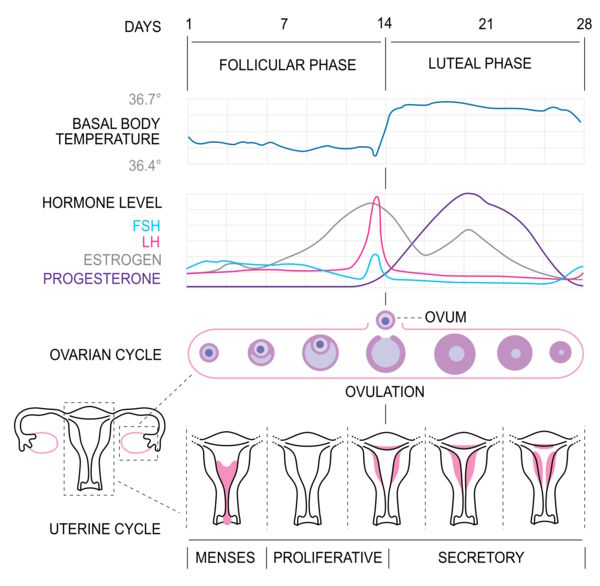
During the follicular phase, the lining of the womb (endometrium) is shed through a period. A hormone stimulates the growth of up to 30 follicles in the ovaries. One follicle will continue to grow and release an egg.
The ovulatory phase is the time when the developed egg is released from the ovaries, ready to be fertilised. During this time, oestrogen levels decrease, and progesterone levels increase.
The final stage, known as the luteal phase, lasts for approximately two weeks. During this time, the follicle which released an egg changes into a structure called a corpus luteum. The corpus luteum will secrete increasing levels of progesterone.
Progesterone promotes the growth of blood vessels that are responsible for the maintenance of the endometrium (the lining of the womb). It helps to thicken the fluids in the uterus, providing a potential embryo with the nutrients it needs to grow.
The levels of oestrogen and progesterone remain high throughout the luteal phases. If pregnancy does not occur, the levels of progesterone and oestrogen decrease and the endometrium breaks down and is removed from the body as a period, marking the start of a new cycle.
To help shed the lining of the uterus, the smooth muscle contracts vigorously. These contractions can compress blood vessels, cutting off their oxygen supply. When the oxygen supply is cut off, the tissues in your womb release pain-causing chemicals and prostaglandins.
What are heavy and painful periods?
Heavy periods, also known as menorrhagia, are hard to define because what is heavy for one woman may not be for another. Yet, in clinical settings, heavy periods are defined as a period that results in at least 80 ml of blood loss, which could last more than 7 days.
Because defining heavy periods is so difficult, mainly because of their subjective and individual nature, the National Institute for Health and Care Excellence (NICE) defines heavy menstrual bleeding as “excessive menstrual blood loss which interferes with a woman's physical, social, emotional, and/or material quality of life, and which can occur alone or in combination with other symptoms.”
The heavy blood flow can be accompanied by moderate to severe pain that can occur during menstruation, sexual intercourse, and passing a stool.
How common are heavy and painful periods?
According to Women’s Health Concern, 1 in 3 women experience heavy periods, while 1 in 20 consult their GP for advice each year about heavy periods. Heavy periods are one of the main reasons menstruating women visit their doctor.
What are the symptoms of heavy and painful periods?
Common signs and symptoms of a heavy period are:
- Needing to change your pad or tampon every 1 to 2 hours
- Needing two types of period products at once, for example, a pad and a tampon
- Having periods lasting longer than 7 days
- Bleeding through your clothes or bedding
- Passing blood clots around the size of a 10p piece
- Feeling tired or short of breath
- Needing to take time off work or avoiding daily activities due to pain
What causes heavy and painful periods?
For around half of the women who get heavy periods, there is no specific cause, and they can be a sign of a normal menstrual cycle. Some women may experience heavy periods at certain life stages, for example, when they first start their periods, after pregnancy, or as they transition through menopause.
Sometimes heavy periods can be caused by:
- Polycystic ovary syndrome (PCOS)
- Fibroids
- Endometriosis
- Adenomyosis
- Pelvic inflammatory disease
- Von Willebrand disease
- Anticoagulant medicines
- Chemotherapy
In rare cases, heavy periods can be a sign of womb cancer.
What treatments are available for heavy and painful periods?
There are several treatments available to manage heavy or painful periods. At Prescription Doctor, we offer the following treatments:
Some types of contraception, such as the combined contraceptive pill, can make periods lighter and less painful.
How quickly do heavy and painful period treatments work?
Heavy-period treatments get to work relatively quickly to help relieve painful or bothersome symptoms. For example, Primolut N can stop bleeding within 48 hours of starting treatment, whereas it can take up to 24 hours for tranexamic acid to take full effect.
How do you take heavy and painful period tablets?
| Medication | Dose | How to take |
|---|---|---|
| Primolut N | 1 x 5 mg tablet 3 times a day for 10 days | Swallow each tablet whole with a glass of water. |
| Provera | 2.5 to 10mg for 5 to 10 days starting 16 to 21 days after your last period started | Swallow each tablet whole with a glass of water. |
| Tranexamic acid | 2 to 3 tablets taken 2 to 3 times per day | Swallow each tablet whole with a glass of water. |
| Utovlan | 1 tablet 3 times a day for 10 days, starting 19 days after your last period began | Swallow each tablet whole with a glass of water. |
Where can I buy treatments for heavy and painful periods?
Prescription treatments for heavy periods are available on the NHS. Other treatments, such as non-steroidal anti-inflammatory drugs like ibuprofen or painkillers like paracetamol, are available over the counter at most pharmacies. If you need a prescription-only treatment, you can request it using our online consultation to obtain a private prescription from one of our clinicians.
Can I buy treatments for heavy and painful periods online?
Yes, you can buy any of the above-mentioned prescription-only treatments for heavy or painful periods from Prescription Doctor. You can complete this by filling out a brief online health consultation form, which will be reviewed and assessed by one of our clinicians to determine your suitability.
Will the NHS prescribe treatments for heavy and painful periods?
You may be able to get heavy period treatments on the NHS, but you will have to speak with your doctor to see if you are suitable for them.
How else can you manage heavy and painful periods?
There are some things you can do to help manage or prevent heavy periods yourself; however, these may not work for everyone. Some of the things you can try include:
- Staying hydrated – drinking plenty of water may help maintain blood volume and replenish fluids lost as a result of heavy periods
- Dietary changes – it’s important to make healthy diet choices if you experience heavy periods, such as eating foods rich in iron to prevent anaemia, such as green, leafy vegetables (spinach, kale), lean red meat, fortified cereals, beans and legumes
- Reducing stress – stress can have a detrimental effect on your period and your mood, so relaxation techniques such as meditation, mindfulness and yoga may help manage stress and positively impact your menstrual cycle
- Heat therapy – applying heat pads or a hot water bottle to your tummy if you experience cramps may help to provide some pain relief
- Gentle exercise – exercising during your period can help to relieve cramps and positively affect your mood
Additional resources
Authored & Reviewed By

Mohamed Imran Lakhi
MPharm - Lead PharmacistPublished on: 18/02/2020 Reviewed on: 21/01/2025
© 2013 - 2025 Al Muhsineen Limited. All Rights Reserved. Registered Pharmacy: 34 Halliwell Road, Bolton BL1 8RL. Registered Office: 254 First Floor, Shearbrow, Blackburn, England, BB1 8DS

